初中英语时态超好讲解任
初中英语五种时态讲解
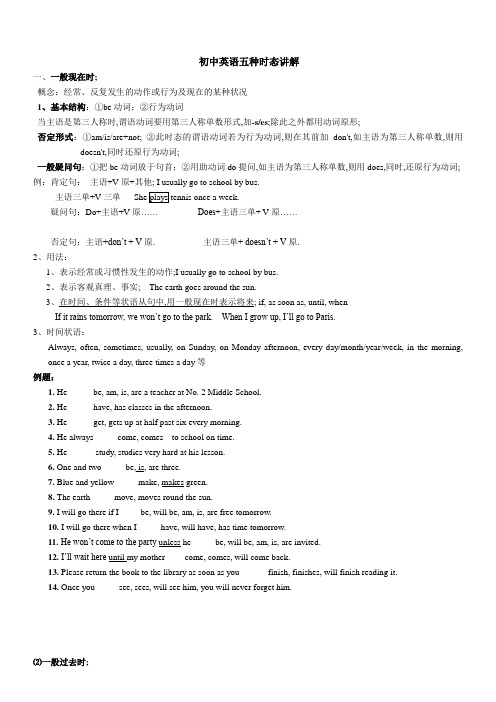
初中英语五种时态讲解一、一般现在时;概念:经常、反复发生的动作或行为及现在的某种状况1、基本结构:①be动词;②行为动词当主语是第三人称时,谓语动词要用第三人称单数形式,加-s/es;除此之外都用动词原形;否定形式:①am/is/are+not; ②此时态的谓语动词若为行为动词,则在其前加don't,如主语为第三人称单数,则用doesn't,同时还原行为动词;一般疑问句:①把be动词放于句首;②用助动词do提问,如主语为第三人称单数,则用does,同时,还原行为动词; 例:肯定句:主语+V原+其他; I usually go to school by bus.主语三单+V三单疑问句:Do+主语+V原…… Does+主语三单+ V原……否定句:主语+don’t + V原. 主语三单+ doesn’t + V原.2、用法:1、表示经常或习惯性发生的动作;I usually go to school by bus.2、表示客观真理、事实; The earth goes around the sun.3、在时间、条件等状语从句中,用一般现在时表示将来; if, as soon as, until, whenIf it rains tomorrow, we won’t go to the park. When I grow up, I’ll go to Paris.3、时间状语:Always, often, sometimes, usually, on Sunday, on Monday afternoon, every day/month/year/week, in the morning, once a year, twice a day, three times a day等例题:1. He______be, am, is, are a teacher at No. 2 Middle School.2. He______have, has classes in the afternoon.3. He______get, gets up at half past six every morning.4. He always _____come, comes to school on time.5. He ______study, studies very hard at his lesson.6. One and two _____be, is, are three.7. Blue and yellow _____make, makes green.8. The earth _____move, moves round the sun.9. I will go there if I ____ be, will be, am, is, are free tomorrow.10. I will go there when I _____have, will have, has time tomorrow.11. He won’t come to the party unless he _____be, will be, am, is, are invited.12. I’ll wait here until my mother ____come, comes, will come back.13. Please return the book to the library as soon as you ______finish, finishes, will finish reading it.14. Once you _____see, sees, will see him, you will never forget him.⑵一般过去时;1、⑴表示过去某个时间发生的动作或存在的状态; I got up late this morning.⑵表示过去的习惯或经常发生的动作;When I was in the countryside. I often swam in the river. I used to go fishing.2、结构:基本结构:①be动词;②行为动词否定形式:①was/were+not; ②在行为动词前加didn't,同时还原行为动词;一般疑问句:①was或were放于句首;②用助动词do的过去式did 提问,同时还原行为动词;例:肯定句:主语+ V过去+其他;疑问句:Did+主语+ V原……否定句:主语+didn’t+ V原3、动词的规则变化;4、时间状语:Yesterday, last night/week/year/month, last Sunday, in 1995, the other day, just now, ago等例题:1. He____be, was, were, been here a moment ago.2. They ____be, was, were, been here just now.3. The scientists _____leave, leaves, leaved, left for America yesterday.4. Last week we ______visit, visited the Science Museum.5. When I was a child, I often ____play, played football.6. The students ran out of the classroom as soon as the bell ____ring, rang, rung.⑶一般将来时;①肯定句:否定句:注:当主语为I 或we时,问句中可用shall where shall we meet tomorrow②be going to+ V原表示计划、打算做某事;用来表示近期或事先考虑过的将要发生的动作以及已有迹象表明必将发生某事,意为“打算;就要”; be going to do 将要干某事---what are you going to do next Sunday ---I am going to listen to music.Look at the clouds, there is going to rain.③现在进行时be +Ving 有时可以表示将来;常用这种结构的动词:go, come, leave, stay, start, arrive We’re leaving for London.例题:1 . _____you ____a doctor when you grow upA .Will; going to be B. Are; going to be C. Are; / D .Will; be2. I don’t know if his uncle _____. I think he _____ if it doesn’t rain.A will come; comesB will come; will comeC comes; comesD comes; will come3 . He will be back _____a few minutes.A withB forC onD in4. What time _____we meet at the gate tomorrowA willB shallC doD are5. He will have a holiday as soon as he _____the work next week.A finishes B. doesn’t finish C will finish D won’t finish6 .There _____some showers this afternoon.A will beB will haveC is going to beD are going to have7. It ____my brother’s birthday tomorrow. She _____a party.A is going to be; will haveB will be; is havingC will be; is going to haveD will have; is going to be8. Li Ming is 10 years old now, next year he _____11.A isB is going to beC will beD will to be与will区别:两者都可表示将要发生的事、将要去做某事,但它们有如下几点区别:1. 表示近期、眼下就要发生的事情,will 表示的将来时间则较远一些,如:He is going to write a letter tonight.He will write a book .2. 表示根据主观判断将来肯定发生的事情,will表示客观上将来势必发生的事情;He is seriously ill. He is going to die.He will be twenty years old.3. be going to 含有“计划,准备”的意思,而will 则没有这个意思,如:She is going to lend us her book.He will be here in half an hour.4.在有的主句中,一般不用be going to, 而多用will, 如:If any beasts comes at you, I'll stay with you and help you4现在进行时1、构成:肯定句:主语+ is / am / are +ving疑问句:Is /Am /Are + 主语+ving否定句:主语+ isn’t / am not / aren’t + ving2、用法:①表示正在进行的动作I’m reading book now.②表示现阶段正在进行的动作或状态; They are studying hard this term.3、时间状语:now , these days, 当句中有look, listen , can’t you see, can you see时Listen He is singing.例题:1. I ____write, am writing, is writing, are writing a letter now.2. Look, it _____begin, is beginning, am beginning, are beginning to rain.3. They ____study, is studying, am studying, are studying medicine at the Medical Institute of Chengde these days.4. He _____teach, am teaching, is teaching, are teaching an English lesson at this time.5 过去进行时1、结构was / were + doing2、用法①表示过去某段时间正在进行的动作---what were you doing at 9:30 last night --- I was watching TV.3、when一般接一般过去时I was doing my homework whenwhile一般接进行时WhileHe was playing basketball while she was reading books.例题:1. I _____cook, cooked, was cooking, were cooking breakfast when you arrived.____you_____ do, did, was...doing, were…doing at this time yesterday eveninghave, are having, had, were having dinner when the doorbell rang.When/ As we____ have, had, are having, were having dinner, the doorbell rang.动词基本变化形式:。
初中英语将来进行时详细讲解
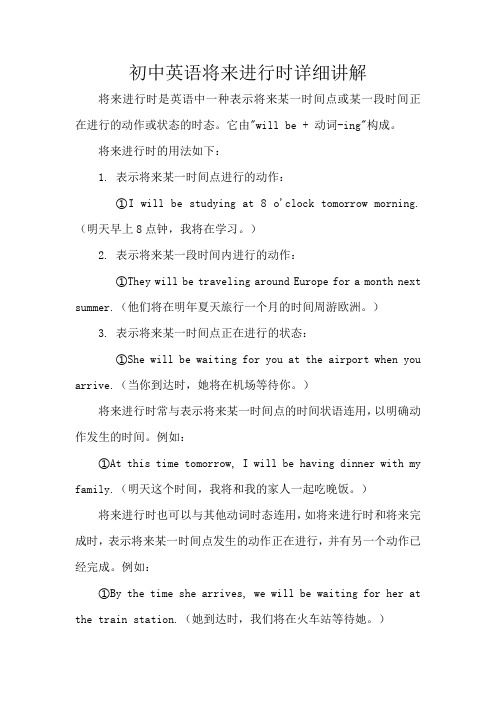
初中英语将来进行时详细讲解将来进行时是英语中一种表示将来某一时间点或某一段时间正在进行的动作或状态的时态。
它由"will be + 动词-ing"构成。
将来进行时的用法如下:1. 表示将来某一时间点进行的动作:①I will be studying at 8 o'clock tomorrow morning.(明天早上8点钟,我将在学习。
)2. 表示将来某一段时间内进行的动作:①They will be traveling around Europe for a month next summer.(他们将在明年夏天旅行一个月的时间周游欧洲。
)3. 表示将来某一时间点正在进行的状态:①She will be waiting for you at the airport when you arrive.(当你到达时,她将在机场等待你。
)将来进行时常与表示将来某一时间点的时间状语连用,以明确动作发生的时间。
例如:①At this time tomorrow, I will be having dinner with my family.(明天这个时间,我将和我的家人一起吃晚饭。
)将来进行时也可以与其他动词时态连用,如将来进行时和将来完成时,表示将来某一时间点发生的动作正在进行,并有另一个动作已经完成。
例如:①By the time she arrives, we will be waiting for her at the train station.(她到达时,我们将在火车站等待她。
)将来进行时并不常用于表示计划、安排或意愿。
对于这些情况,一般使用将来时。
同时,将来进行时也不常用于肯定句中,更常用于疑问句或否定句中,表示对未来的不确定性或推测。
初中英语时态讲解(完整版)

英语时态讲解一般完成时进展时完成进展时现现在一般时现在完成时现在进展时现在完成进展时在Do/does Havedone Have/hasbeingHasdone Is/aredoing doing过去一般时过去完成时过去进展时过去完成进展时过去did Haddone Was/weredoing Hadbeendoing将来一般时将来完成时将来进展时将来完成进展时将Willdo Will have Willbedoing Willhavebeen 来done doing过去将来一般过去将来完成过去将来进展时过去将来完成进过Wouldbedoing去时时行时将Woulddo Would have Wouldhavebeen 来done doing时态详解:一般现在时1.一般现在时的应用(1)表示经常发生的动作或存在的状态。
常用频度副sometimes,often,always,usually,seldom 以及时间副词everyday/night/week/month/year,inthemorning,intheafternoon,intheevening,atnight做状语。
如:Heoftenstaysuplate.他常熬夜。
Wegohomeeverymonth.我们每月都要回家。
IwatchTVatnight.我晚上看电视。
(2)表示客观真理或永恒的状态。
如:Theearthtravelsroundthesun.地球绕太阳旋转。
Treesturngreeninspring.春天树木变绿。
Liquidturnsintogaswhenitishotenough.足够热时,液体变为气体。
Practicemakesperfect.熟能生巧。
(3)现阶段的状态。
常跟时间副词now连用。
如:HelivesinBeijingnow.他现在住在。
Sheisathome.她在家。
Theyworkinthatfactory.他们在那家工厂工作。
初中英语 人教版八年级上时态复习+条件状语从句
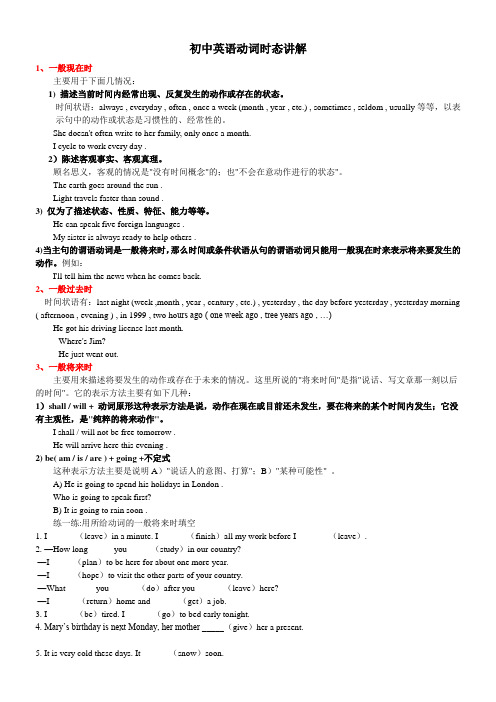
初中英语动词时态讲解1、一般现在时主要用于下面几情况:1) 描述当前时间内经常出现、反复发生的动作或存在的状态。
时间状语:always , everyday , often , once a week (month , year , etc.) , sometimes , seldom , usually等等,以表示句中的动作或状态是习惯性的、经常性的。
She doesn't often write to her family, only once a month.I cycle to work every day .2)陈述客观事实、客观真理。
顾名思义,客观的情况是"没有时间概念"的;也"不会在意动作进行的状态"。
The earth goes around the sun .Light travels faster than sound .3) 仅为了描述状态、性质、特征、能力等等。
He can speak five foreign languages .My sister is always ready to help others .4)当主句的谓语动词是一般将来时,那么时间或条件状语从句的谓语动词只能用一般现在时来表示将来要发生的动作。
例如:I'll tell him the news when he comes back.2、一般过去时时间状语有:last night (week ,month , year , century , etc.) , yesterday , the day before yesterday , yesterday morning ( afternoon , evening ) , in 1999 , two ho urs ago ( one week ago , tree years ago , …)He got his driving license last month.--Where's Jim?--He just went out.3、一般将来时主要用来描述将要发生的动作或存在于未来的情况。
初中英语时态讲解
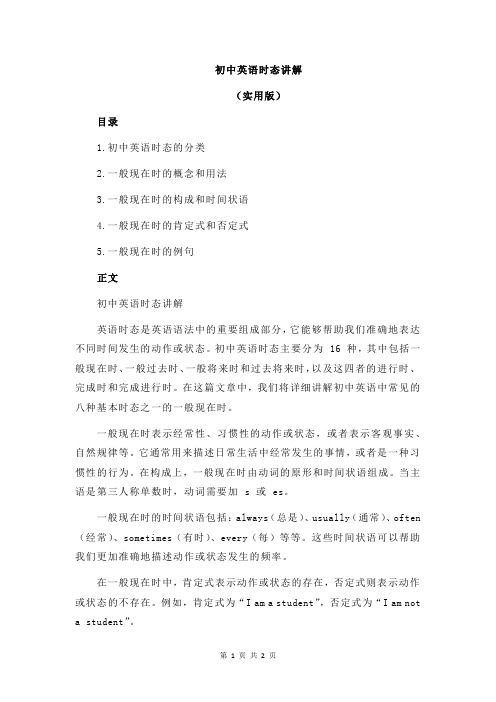
初中英语时态讲解(实用版)目录1.初中英语时态的分类2.一般现在时的概念和用法3.一般现在时的构成和时间状语4.一般现在时的肯定式和否定式5.一般现在时的例句正文初中英语时态讲解英语时态是英语语法中的重要组成部分,它能够帮助我们准确地表达不同时间发生的动作或状态。
初中英语时态主要分为 16 种,其中包括一般现在时、一般过去时、一般将来时和过去将来时,以及这四者的进行时、完成时和完成进行时。
在这篇文章中,我们将详细讲解初中英语中常见的八种基本时态之一的一般现在时。
一般现在时表示经常性、习惯性的动作或状态,或者表示客观事实、自然规律等。
它通常用来描述日常生活中经常发生的事情,或者是一种习惯性的行为。
在构成上,一般现在时由动词的原形和时间状语组成。
当主语是第三人称单数时,动词需要加 s 或 es。
一般现在时的时间状语包括:always(总是)、usually(通常)、often (经常)、sometimes(有时)、every(每)等等。
这些时间状语可以帮助我们更加准确地描述动作或状态发生的频率。
在一般现在时中,肯定式表示动作或状态的存在,否定式则表示动作或状态的不存在。
例如,肯定式为“I am a student”,否定式为“I am not a student”。
以下是一些一般现在时的例句:1.I always go to school by bike.(我总是骑自行车上学。
)2.She usually cooks dinner for us.(她通常为我们做晚饭。
)3.He often goes to the park on weekends.(他经常在周末去公园。
)4.They sometimes watch movies in the evening.(他们有时在晚上看电影。
)5.Every morning, I eat an apple.(每天早上,我吃一个苹果。
)通过以上例句,我们可以看到一般现在时在描述经常性、习惯性的动作或状态时的用法。
初中英语十六种时态讲解

初中英语十六种时态英语时态分为16种:一般现在、一般过去、一般将来、过去将来时,以及这四者的进行时、完成时和完成进行时。
英语共有十六种时态,其表现形式如下(以study为例)一般时进行时完成时完成进行时现在study be studying have studied have been studying过去studied be studying had studied had been studying将来will study will be studying will have studied will have been studying过去将来would study would be studying would have studied would have been studying时态(Tense)是表示行为、动作和状态在各种时间条件下的动词形式。
因此,当我们说时态结构的时候,指的是相应时态下的动词形式。
1. 一般现在时用法:A) 表示现在发生的动作、情况、状态和特征。
B) 习惯用语。
C) 经常性、习惯性动作。
例:He always helps others. (他总是帮助别人。
)D) 客观事实和普遍真理。
尤其要注意,如果前后文不是一般现在时,则无法保持主句、从句时态一致。
E) 表示一个按规定、计划或安排要发生的动作,(仅限于某些表示“来、去、动、停、开始、结束、继续”等的动词)可以与表示未来时间的状语搭配使用。
常见的用法是:飞机、火车、轮船、汽车等定期定点运行的交通方式。
例:The next train leaves at 3 o'clock this afternoon.(下一趟火车今天下午3点开车。
)How often does this shuttle bus run? (这班车多久一趟?)F) 在时间和条件状语从句里经常用一般现在(有时也用现在完成时)表示将来事情。
初中英语八大时态知识点详解 5
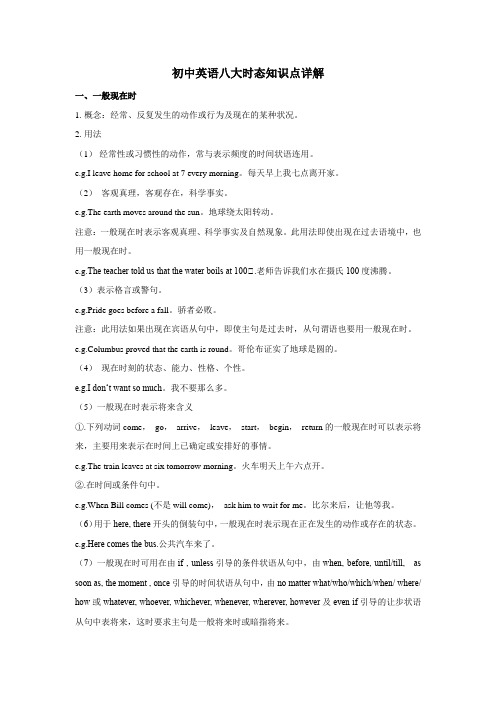
初中英语八大时态知识点详解一、一般现在时1.概念:经常、反复发生的动作或行为及现在的某种状况。
2.用法(1)经常性或习惯性的动作,常与表示频度的时间状语连用。
e.g.I leave home for school at 7 every morning。
每天早上我七点离开家。
(2)客观真理,客观存在,科学事实。
e.g.The earth moves around the sun。
地球绕太阳转动。
注意:一般现在时表示客观真理、科学事实及自然现象。
此用法即使出现在过去语境中,也用一般现在时。
e.g.The teacher told us that the water boils at 100℃.老师告诉我们水在摄氏100度沸腾。
(3)表示格言或警句。
e.g.Pride goes before a fall。
骄者必败。
注意:此用法如果出现在宾语从句中,即使主句是过去时,从句谓语也要用一般现在时。
e.g.Columbus proved that the earth is round。
哥伦布证实了地球是圆的。
(4)现在时刻的状态、能力、性格、个性。
e.g.I don‘t want so much。
我不要那么多。
(5)一般现在时表示将来含义①.下列动词come,go,arrive,leave,start,begin,return的一般现在时可以表示将来,主要用来表示在时间上已确定或安排好的事情。
e.g.The train leaves at six tomorrow morning。
火车明天上午六点开。
②.在时间或条件句中。
e.g.When Bill comes (不是will come),ask him to wait for me。
比尔来后,让他等我。
(6)用于here, there开头的倒装句中,一般现在时表示现在正在发生的动作或存在的状态。
e.g.Here comes the bus.公共汽车来了。
(7)一般现在时可用在由if , unless引导的条件状语从句中,由when, before, until/till, as soon as, the moment , once引导的时间状语从句中,由no matter what/who/which/when/ where/ how或whatever, whoever, whichever, whenever, wherever, however及even if引导的让步状语从句中表将来,这时要求主句是一般将来时或暗指将来。
初中英语八大时态讲解
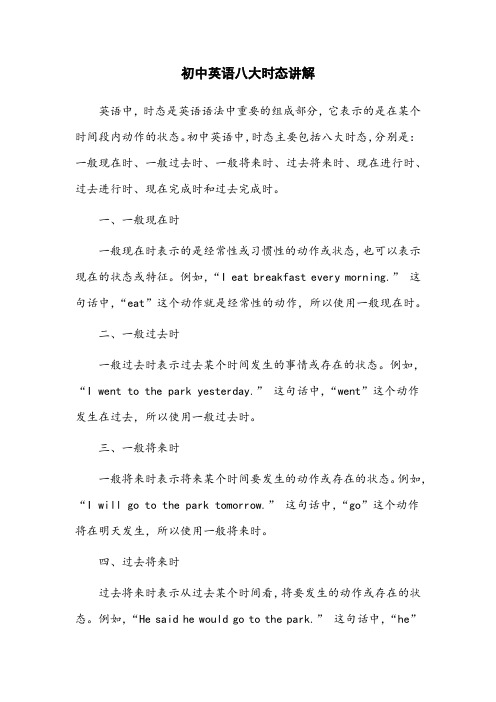
初中英语八大时态讲解英语中,时态是英语语法中重要的组成部分,它表示的是在某个时间段内动作的状态。
初中英语中,时态主要包括八大时态,分别是:一般现在时、一般过去时、一般将来时、过去将来时、现在进行时、过去进行时、现在完成时和过去完成时。
一、一般现在时一般现在时表示的是经常性或习惯性的动作或状态,也可以表示现在的状态或特征。
例如,“I eat breakfast every morning.”这句话中,“eat”这个动作就是经常性的动作,所以使用一般现在时。
二、一般过去时一般过去时表示过去某个时间发生的事情或存在的状态。
例如,“I went to the park yesterday.”这句话中,“went”这个动作发生在过去,所以使用一般过去时。
三、一般将来时一般将来时表示将来某个时间要发生的动作或存在的状态。
例如,“I will go to the park tomorrow.”这句话中,“go”这个动作将在明天发生,所以使用一般将来时。
四、过去将来时过去将来时表示从过去某个时间看,将要发生的动作或存在的状态。
例如,“He said he would go to the park.”这句话中,“he”认为“he would go to the park”是未来要发生的事情,所以使用过去将来时。
五、现在进行时现在进行时表示正在进行的动作或存在的状态。
例如,“I am eating an apple.”这句话中,“eating”这个动作正在进行,所以使用现在进行时。
六、过去进行时过去进行时表示过去某个时间正在进行的动作或存在的状态。
例如,“She said she was watching TV at 8 o’clock last night.”这句话中,“watching TV”这个动作在昨晚8点正在进行,所以使用过去进行时。
七、现在完成时现在完成时表示过去发生的动作对现在造成的影响或结果,也可以表示持续到现在的动作或状态。
- 1、下载文档前请自行甄别文档内容的完整性,平台不提供额外的编辑、内容补充、找答案等附加服务。
- 2、"仅部分预览"的文档,不可在线预览部分如存在完整性等问题,可反馈申请退款(可完整预览的文档不适用该条件!)。
- 3、如文档侵犯您的权益,请联系客服反馈,我们会尽快为您处理(人工客服工作时间:9:00-18:30)。
2.结构 have/has + done
3.标志词:already, just, yet, ever, never, so far(till now/up to now), recently, in the past 3 years, before, since+时间点,for+时间段
4.瞬间动词和延续性动词 若句中出现时间段(for/since),
A.has played B.will play C.was playing D.is playing
注意
A.有几个瞬间动词可以用现在进行时表将
来,如:begin,start,come,go,leave。
1.--Lucy! Would you like to give me a hand?
--OK. I____.
四、现在进行时
1.用法: A.现在动作 B.现阶段动作
2.结构: is/am/ are + doing 3.标志词:
now,Look! Listen! at present, at this moment --Mike, who____football in the yard? --Let me go and see. (2010顺义)
1.The boy usually_g_e_t_s (get) to school early. 2.Light _t_r_a_v_el_s(travel)faster than sound.
一般现在时的注意点:
、 在when ,as soon as, until, after, before等到引导的时间状语从句和if ,as long as, unless引导的条件状语从句中,
3.标志词:at that moment, at this time yesterday,
at nine last night, when…
【2010河北省卷】44. I _D_______ my
clothes when the phone rang.
A. wash
B. washed
B. am washing D. was washing
3.The man died a week ago.
The man_h_a_s _b_e_e_n_d_e_a_dfor a week.
4.He joined the club 3 days ago. He_h_a_s_b_e_e_n_in__the club for 3 days.
5.They got married 10 years ago. They_h_a_v_e_b_e_e_n_m__a_rr_i_e_dfor 10 years.
二、一般过去时
1.用法: 过去的动作或状态。 2.结构: 3.标志词:
yesterday, the day before yesterday, three days ago, last night/week/month…,in the past;just now=a moment ago, in 1990
六、现在完成时 1.用法:
1 过去的动作已经结束对现在的影 响或结果。 --Mum, can I watch TV ? I __h_av_e__f_in_i_sh_e_d_( finish) my homework.
--Of course, you can
2 过去的动作持续到现在,还可能继续持续。
A.will come
e
C.am coming
D.would come
2.--When____you____for Toronto? --Tomorrow. A.do;leave B.are;leaving C.will;leaving D.shall;leave
B.现在进行时和always连用,表示说话 人较强烈的感情色彩。
用一般现在时表示将来.
如果明天不下雨,我们将去野营。 —If —it—do—e—sn—’t —ra—in—to—m—or—ro—w,—w—e’—ll g—o—ca—mping. 她一到达那儿,就会给你写信。 —Sh—e—’ll—w—rit—e —to—yo—u—as—s—oo—n—as—s—he—g—et—s —th—ere—.
二、时态的种类:初中常见的6种时态
一般现在时
一般过去时 一般将来时
现在进行时 现在完成时
过去进行时
各种时态的用法
一、一般现在时
1.用法:
A.现在经常性的动作或状态
2.结构: 3.标志词:
B.客观事实和真理。
always,usually,often, sometimes, never, every day /week/month/year/…
【2010河北省卷】39. I ___B_____ a mistake.
Please don’t be angry with me.
A. make
B. made
C. will make D am making
三、一般将来时
1.用法:将来的动作或状态。 2.结构: 3.标志词: tomorrow, soon, the day after tomorrow, in three days, in (the) future, next week/month/term…, from now on
则必须使用延续性动词。瞬间动词 和延续性动词转换关系如下:
1.The film began 5 minutes ago. The film_h_a_s_b_e_en__o_nfor 5 minutes.
2.They left an hour ago.
They_h_a_v_e_b_e_e_n_a_w_a_yfor an hour.
• The boy ___is___always h_e_l_p_in_g_ us! (夸赞)
•You __a_re_ always m__a_k_in_gthe same mistake! (责备)
五、过进行的动作。 2.结构:was/were +doing
6.He came here an hour ago. He_h_a_s _b_e_en_ here since an hour ago.
